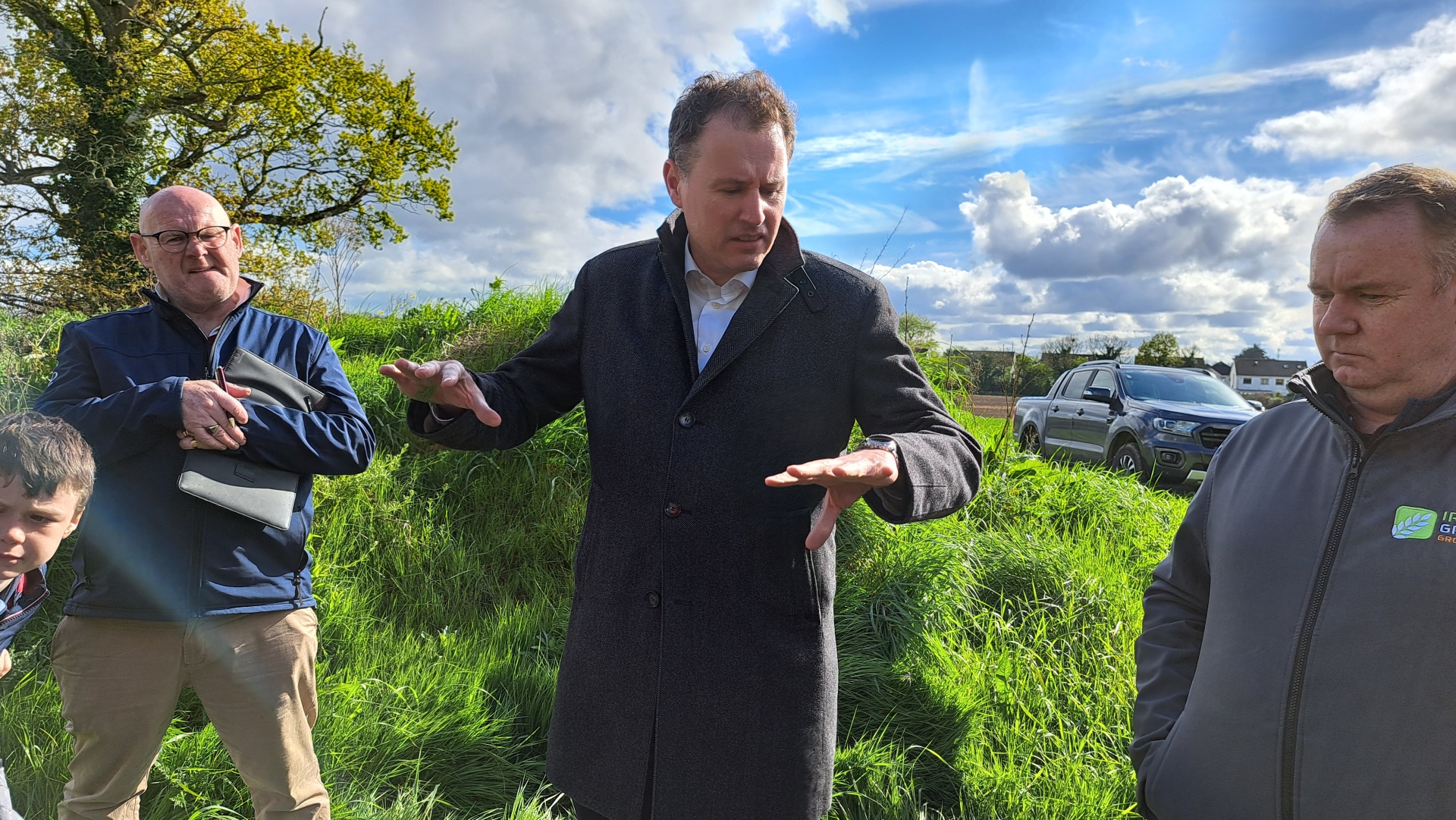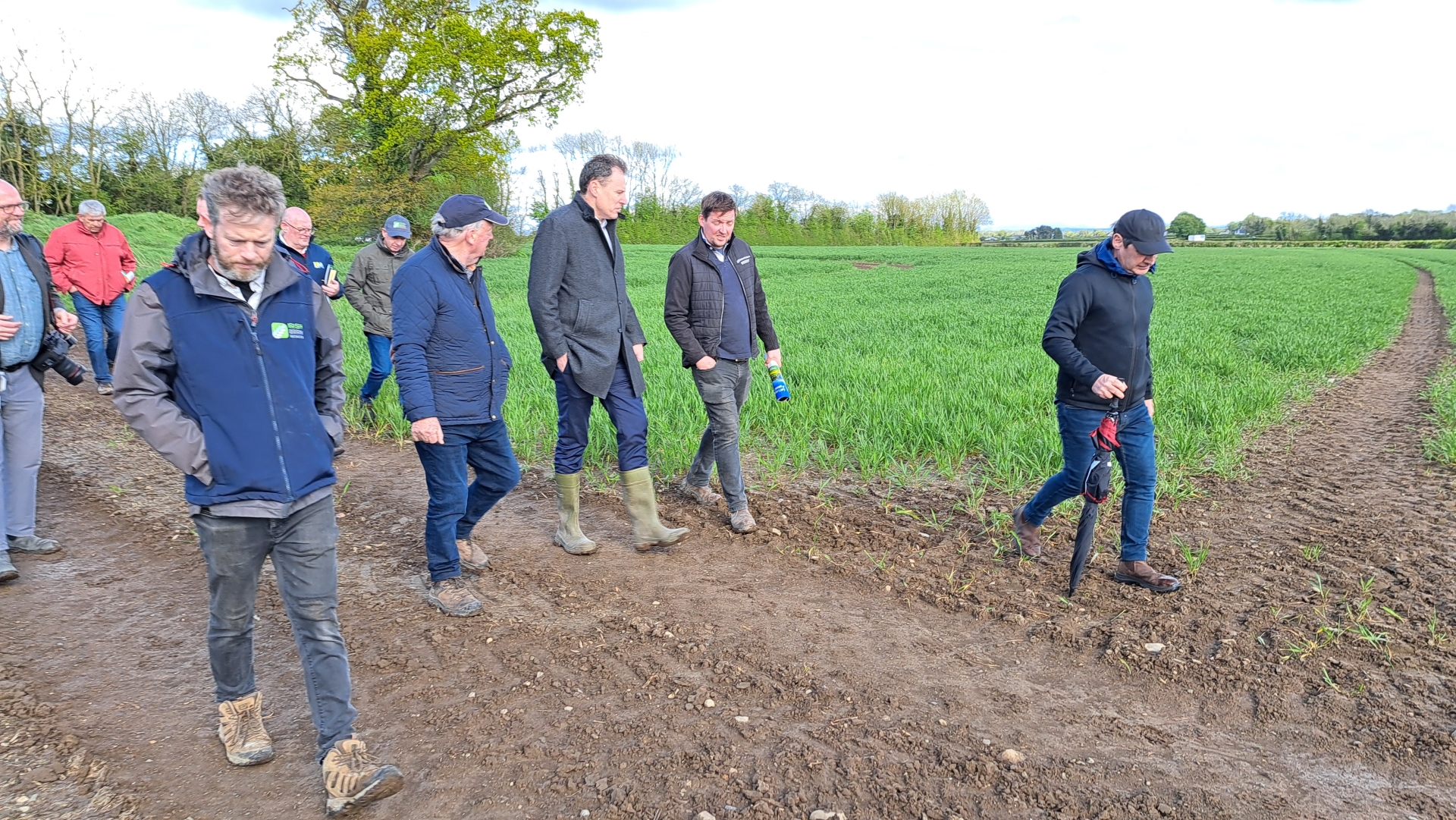
Minister for Agriculture, Charlie McConalogue, TD, with (L-R) landowners Pat Cleary and Darragh Cleary and Bobby Miller, chairman of Irish Grain Growers in Ballybrittas. Pic: Maxwells
Minister Charlie McConalogue was left in no doubt about what declared as a year of ‘pure hardship’ faced this year by tillage farmer on a visit to Laois land.
The Agriculture Minister walked freshly tilled Laois ground just outside Ballybrittas where he met a delegation from the Irish Grain Growers to hear first hand about problems and solutions both short term and long term.
The land inspected on April 30, is being farmed by Pat and Darragh Cleary. While based near Monasterevin they sow crops in Laois.
He said they’ve already had to scrap winter wheat sown on the Ballybrittas site due to the weather. He said it was one of their biggest earning crops. The land was subsequently redrilled with spring barley.
Darragh also told the Minister about having to pay multiple failed harvest and sowing visits to a parcel of land in the Ballyroan area due to weather conditions which will cost himself and his father Pat significantly extra to harvest.
“It’s pure hardship the year that we have had,” he said.
His father Pat praised Minister McConalogue for his commitment to the sector but said the figures show that tillage farming is declining but the costs are bigger.
“What we spend on inputs is way above what any other sector in farming spends,” he said.
He said his son Darragh has invested significantly in equipment but he fears for the future young growers face.
“We need some hope for people in the younger generation like him…we are seven generations farming, I don’t want Darragh to be the last generation but that’s with what might happen the way things are going - that is how serious it is.
“My ancestors survived famine, wars but we mightn’t survive if it continues the way it is going,” he said.
He pleaded with the Minister to help. MORE BELOW PICTURE.

Pictured: Minister McConalague speaks in Ballybrittas.
“You more than anybody - it’s in your hands to do something,” he said.
Ratheniska farmer Colm Fingeton highlighted the impact on growing malting barley. He said sowing could have begun in late February / early March with other ground sown later.
He was also critical of big beer and whiskey companies who buy their products as the key ingredients. He said that while Guinness and Irish Distillers have strong Irish bases, they have not been asked how they are going to help the Irish tillage farmers. He said he has almost given up growing malting barley because of the obstacles placed by such companies.
“Those companies are going to have to start working with the farmers to deal with the weather. We can’t get the fine-tuned quality that they want every year and we need more flexibility,” he said.
Nicky Keane travelled from Wexford to highlight the dire situation in the southeast. He told the Minister that some crops have already rotted in the ground while a huge amount of land has been impossible to work.
“I don’t know when we are going to sow. It is malting barley, oats beans - they all should have been sown before April 1,” he said.
He too appealed for help over and above the €100 per hectare payment.
“The €100 per hectare scheme is a sticking plaster. We need a plan...I know you can’t do anything about the weather but our industry needs support - we are not looking for a handout - we are looking for a scheme,” he said.
He told the Minister that tillage is carbon neutral and makes the best use of nitrogen in farming and should be prioritised for growth.
"It’s an open goal for you Minister. Your Goverment is coming to the end of the year but you can make a stand and put tillage in a better place going forward. If not, the amount people that are going to leave tillage farming this year is going to be huge,” he said.
Bobby Millar wanted the highs and lows to be reduced by strategic investment. He agreed that tillage farmers didn’t expect money to be thrown at the sector with no return but climate needs to be planned for.
“We do need to factor in weather impact and how we deal with that going forward. Strategic thinking is needed by the Government and farmers,” he said.
He was adamant that farmers need structured support to reduce the risk.
“We do not want to be coming with the begging bowl every year or other year. We just want firm foundations for the sector and we do not think the support has been there,” he said.
Various proposals were put to the minister that would improve the situation such as plough based tillage, a focus on high-yield sowing, the updating of the TAMS scheme to match the current cost of machinery which is doubling. Tax incentives for carbon-neutral farming were also proposed.
The supply of tariff-free grain from Ukraine due to war there was also identified as another reason by Pat Cleary for a long term strategy.
“We don’t want our incomes to be dictated by what Putin does in the Ukraine. We need long-term food security in this country and we can do,” he said.
He also highlighted the potential for tillage farming if Irish mills were compelled to take in Irish-grown grain. He said research has shown that Irish farmers can sow the best quality milling wheat. He recalled grain being brought to Portarlington from Monasterevin at Odlums for milling.
“That market is gone from us at the moment,” he said.
Ratheniska’s Clive Carter raised a similar point.
“It is very difficult as a tillage farmer when you produce this low carbon, sustainable quality product to then see a boat from the other end of the world tipped into the same shed as Irish crops and then sold as Irish product,” he said.
He believes this misleads consumers into thinking that they are consuming an Irish product when they are not.
“It is frustrating, difficult and demoralising,” he said.
Minister McConalogue acknowledged the situation faced in the last year to 18 months have been extremely challenging. More below picture.

The minister walks the land with Pat and Darragh Cleary flanked by Colm Fingleton and Clive Carter
“It has been a very difficult spring on the back of a tremendously difficult harvest that hadn’t been seen in many years so you have got it at both ends,” he said.
He said he was very much aware of the wider situation in terms of pressure on land availability over the last year.
He believes that the sector must expand.
“What we needed to do is see the sector grow. We don’t grow enough for our own needs. We only grow about a third of what we consume but we have the highest yields in the whole world. Obviously, the cost base is more challenging but the yields are very strong.
“So it makes a lot of sense for our domestic food system that we would produce more locally. That is an objective of Government,” he said.
He said he would be looking at detail of the Food Vision Group to see what steps could be taken to see land used for tillage reach 400,000 hectares. He said he appointed the committee that came up with the now complete Food Vision Report. He said he did so to allow farmers to have input to examine and propose a plan for the future.
As to implementation, he said he has the final report and it would be considered and advanced within the next ‘couple of months’.
“I am now looking at it and will then put in place an implementation plan coming out of it,” he said.
The Minister said the Government would be briefed and said there are ‘significant funding asks’ in a report which contains a lot of good ideas and suggestions.
“Every sector will ask for funding but there are constraints on the Government’s capacity to deliver,” he said.
He said the recent commitment of €100 per hectare support for field grown crops harvested in 2024 was made to underpin farmers through the difficult year they have had.
“I know that is not going to address all the issues but it is a significant contribution because it is going to be in the region of €30 million,” he said.
He said Ireland is one of the few countries in the EU to have put in a scheme to compensate farmers for the weather. He described the support as a ‘no strings attached’ payment for field-grown crops excluding protein produce such as beans and peas.
He said any money allocated must make sense.
“It has to make structural sense. We can’t have a situation, where generally across the sectors, we are just fueling land demand that is ultimately only ending up in the hands of land owners and not food producers,” he said.
He said any measures on the tax front could only be considered in the context of the budget.
While he accepted the difficulties exist he also said the tillage is viable.
“Across the farming sectors, it is the second most profitable on an average outlook. The income for tillage per hectare is second to dairy and per labour unit would be on a par with dairy farming,” he said.
Mr McConalogue added that the price of grain is important to other farmers as it’s required for feed and affects their competitiveness.
In a statement released after the visit, the Department of Agriculture said additional supports included a top-up of €3m for Protein Aid bringing the total budget to €10m. The Straw Incorporation Measure provided €16.5 million and the Tillage Incentive Scheme provided €8.3 million to growers in 2023. The €7.147m secured from the EU Agricultural Reserve was topped up with a further €7.147m in State funding.
It said these funds were used to support growers with unharvested crops by way of an Unharvested Crop Support Scheme with the remaining funds being used as a once-off flat rate payment on the area of oilseed rape and cereal crops.
In March, the Minister also announced an exemption to the crop diversification element of GAEC 7, easing concerns for tillage farmers by allowing them to pick the crops that best suit their circumstances, taking account of time of sowing, market returns and seed availability.
Subscribe or register today to discover more from DonegalLive.ie
Buy the e-paper of the Donegal Democrat, Donegal People's Press, Donegal Post and Inish Times here for instant access to Donegal's premier news titles.
Keep up with the latest news from Donegal with our daily newsletter featuring the most important stories of the day delivered to your inbox every evening at 5pm.